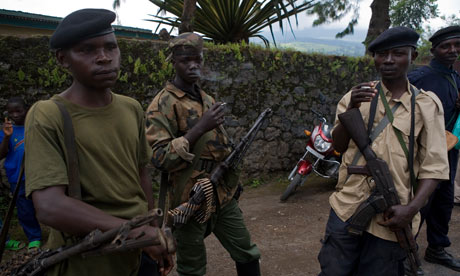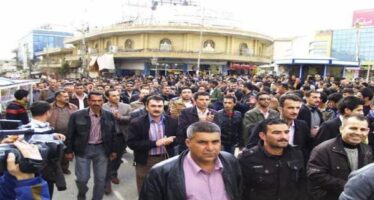Fertile land the prize that could reignite ethnic conflict in DR Congo
![]()
Fertile land the prize that could reignite ethnic conflict in DR Congo
Land remains the greatest prize in North Kivu as residents grow uneasy over the return of the Congolese Tutsis from Rwanda
Xan Rice in Masisi

Young CNDP soldiers in the town of Rugare, north of Goma. Photograph: Sean Smith
Leaving behind the mass of humanity that is Goma, the dirt road climbs steadily as it switchbacks through the emerald hills. Clear streams run in the valleys, and on the slopes both cows and vegetables grow fat from the lush grass and fertile soil.
For more than a decade North Kivu has been at the centre of the fighting in eastern Democratic Republic of Congo. Rebel groups’ and foreign armies’ lust for mineral riches is usually cited as one of the main causes of the war.
But high up in the vast Masisi territory on the Rwandan border, 50 miles and several hours’ drive north-west of Goma, the riches are not under the ground. It is the land itself that is the greatest prize.
And now – after a reduction in open conflict, if not civilian suffering – tensions over land have again risen so high that local government officials and rebel groups say they could spark a new round of ethnic conflict.
The friction stems from the planned homecoming of 54,000 Congolese Tutsis, a minority group in eastern Congo, who have been living in camps across the border in Rwanda since the mid-1990s. The repatriation was agreed by the two countries and the UN refugee agency (UNHCR) earlier this year.
Aid groups questioned the decision, since military operations against rebels are continuing in North Kivu, and nearly 800,000 people remain internally displaced there. But for many local residents, who have been deeply mistrustful of Rwanda’s Tutsi-led government since it first sent its army across the border in the late 1990s, the fears are not for the refugees’ welfare, but their own.
They believe the refugee numbers have been vastly – and deliberately – exaggerated by Rwanda in an attempt to grab their land and to consolidate the local rule of the CNDP, a powerful Tutsi-dominated rebel group turned political party that controls more of North Kivu than the government.
The fears among ethnic groups such as the Hunde, Nande, Hutu and Nyanga are so strong that some civilians and militias “are arming themselves for when the Tutsis return to try to take their land”, according to one senior government official in Masisi territory.
Meanwhile, the CNDP and Rwanda say the overall refugee figure is well over 100,000 when Congolese Tutsis living outside the camps are taken into account, adding to the confused – and highly combustible – situation.
“I can tell you for sure that if these returns happen now there will be catastrophe,” said Jason Luneno, president of the civil society of North Kivu. “People say they will protect their land until the last drop of blood is spilled.”
The Congolese Tutsis trace their history in North Kivu to before independence from Belgium in the 1960s, when their forebears crossed from Rwanda to escape famine and ethnic clashes, and adopted a new nationality.
But in 1994 the arrival in Congo of fleeing Hutu killers, who had tried to wipe out Rwanda’s Tutsi population, caused many Congolese Tutsis to seek sanctuary back across the border when Paul Kagame’s Tutsi rebel army had taken power and promised safety. Since then, much of eastern Congo has been in crisis. The Hutu militiamen created a feared rebel group called the FDLR (Forces Democratiques de Liberation du Rwanda), which remains the major obstacle to stability in North Kivu.
In time, with backing from Rwanda, the CNDP emerged as a powerful – and wealthy – counterforce, with the stated aim of protecting local Tutsis.
Taxes and control of the illegal charcoal trade yielded – and continue to yield – millions of dollars a year, much of it channelled to powerful Rwandan political and army figures. The same elite also imported many of the cattle – or “vaches sans frontières” as locals describe them – that graze the pastures in Masisi.
Following a peace agreement with the Congolese government, CNDP forces were integrated into the Congolese national army last year. But they retained their command structures, and the party continues to run lucrative parallel administrations across much of North Kivu. Together with the Rwandan government, which claims there are tens of thousands more Congolese Tutsis living outside the camps in Rwanda, the party is leading the push for the refugees’ return.
“The CNDP is following this closely: nothing should prevent our brothers from coming home,” said Rutagarama Ntavutse, leader of the Tutsi community in North Kivu. “The refugees were cow farmers before they left, and had a lot of land. But now people have taken that land. That’s why they don’t want them back.”
But leaders of non-Rwandophone communities in North Kivu tell a different story. Alexis Tussi, chief of the Osso district in Masisi, said many of the refugees who left his area in the 1990s had sold their farms beforehand, so they had no right to the land on their return.
He also claimed that the 54,000 figure used by UNHCR was impossibly high, based on the number of people that fled at the time.
Biiri Ngulu, the king of the Biiri district, further up the road, said that unknown people had recently arrived in his district from Rwanda, claiming to be Congolese refugees, yet they could not speak the local language and did not know the geography. Separate reports from the US-based Refugees International and Enough group earlier this year also mentioned cases of Rwandans falsely claiming to be returning Congolese – a phenomenon that has further raised suspicions among local people.
“War in Masisi always runs around land,” Ngulu said. “So this can create another war.”
During a heated meeting in Goma in July, designed to ease tensions, Rwandan, Congolese and UNHCR officials agreed that traditional leaders from North Kivu would be allowed to travel to the Rwandan camps to verify the refugees’ claims of Congolese nationality.
Salif Kagni, the UNHCR’s co-ordinator in eastern Congo, said that when repatriation did occur, it would be voluntary, and would take place only in areas that were considered safe.
But many wonder where is safe. This week reports emerged of a mass rape and assault against 150 women and children in a town in Walikale, where the FDLR is strong. The ongoing Operation Amani Leo (meaning Peace Today) by the Congolese army, backed by the UN, has succeeded in driving the Hutu rebels away from some of the more populated areas in most other parts of North Kivu.
But in numerous villages in Masisi territory, displaced people said they are still too afraid to go back to their homes. In her hilltop office in Masisi town, territory administrator Marie-Claire Bangwene Mwavita said the area was still far from secure. The FDLR rebels were less than five miles away. Mai Mai rebel groups – community-based militias – were also a threat, as their integration into the national army had failed, she said.
Indeed, Didier Bitaki, spokesman for all the Mai Mai groups in Congo, warned that a formal repatriation of people from Rwanda would be extremely provocative – and dangerous. “These people [the refugees in Rwanda] are not Congolese. When they lived here they claimed they were Rwandan. Now they want to come back. Repatriation is impossible.”
One area where the refugees might feel safe is the CNDP stronghold of Kitchanga, several hours’ drive from Masisi. Government soldiers – mainly former CNDP rebels – man a roadblock at the town entrance. Others stroll around town with AK-47s and grenade launchers. Many of the non-Tutsi residents look on warily. The soldiers take food from farmers’ fields, and force locals to carry heavy loads for them, according to residents. Now, many fear they will to lose their land if the refugees return with the CNDP’s blessing.
“The soldiers even broke my window to frighten me,” said Etienne Mabudnana, a district chief based in the town, pointing to a shattered pane. “If a chief can be frightened, what about the population?”
Related Articles
Entevista a Ghayath Naisse: “En Siria, tenemos más de 250 manifestaciones cada semana, no paran”
![]()
Ghayath Naisse es un destacado militante de la Corriente de la Izquierda Revolucionaria en Siria. Este grupo marxista, activo dentro de
Sulaimaniya: Day 24 of protest
![]()
Karzan Kardozi, once again tells us of the day of protest in Sulaimaniya. Incredibly there are virtually not news about
Syrian rebels cling to bullets and hope
![]()
While the west looks elsewhere, President Bashar al-Assad’s regime is exploiting sectarian divisions Martin Chulov in Jebel al-Zawiya Syrian mother



